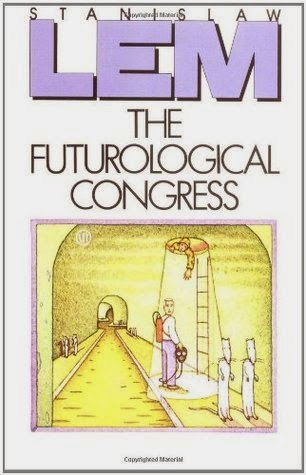The Futurological Congress by Stanislaw Lem.
Lem is one of my all time favorite science fiction writers because of his uniquely empiric writing style. His ideas pre-date many themes of popular culture. such as Matrix or Inception but I never see his name pop up in reference to any of these.

Source: Stanislaw Lem (1985). The Futurological Congress: From the Memoirs of Ijon Tichy. San Diego: Harcourt Brace Jovanovich.
The main character, Ijon Tichy is a reoccuring space traveler throughout Lem's books. In Peace on Earth his two brain hemispheres get severed on a secret government spy operation on the moon and suddenly finds himself in a sticky situation: one of his brain regions seems to be conspiring against the other. Stanislaw Lem is really talented at creating such absurd situations, whilst depicting scientific concepts such as the symptoms of split-brain patients. His writings often reflect how our technologies will inevitabley inherit our human mistakes and thus science is in this sense limited by our own nature.
In this dystopic novel Ijon Tichy finds himself at the 8th world futurological congress in Costa Rica. Earth has gathered its top scientists to solve a massively growing problem: overpopulation. The overpopulation has gotten so bad, that there are even too many scientists. Not to worry, scientists and publications are given coded numbers and they devise elaborate spreadsheets that keep track of each other. While the scientists are busy quoting each other’s numbers, revolution and turmoil breaks out in Costa Rica. The government deploys Love Thy Neighbour Bombs that consist of weaponized LSD and MDMA. Psychedelic fumes are deployed to break up the violent masses and the water supplies is contaminated with MDMA. Ijon Tichy escapes what has become a drug-infused orgy, but unkowingly drinks the tainted water supply. He realizes the infinitel love towards all of humanity, so overwhelming one cannot but start loathing thy self. As the psychedelic orgy runs amock, the government is pushed to more and more drastic measures. In Aldous Huxley's Brave New World, the masses are subdued into submission with the help of Soma. Huxley foresaw a world wherein drugs could sedate misery and a government that enforced conditioned happiness. What Stanislaw Lem foresaw was our ability to change our perception and author our own sensations! As our understanding of the human psyche grows, so do the possibilities of hacking into our perception and creating virtual spaces in reality.
Perceptual Hacking
This is a term I borrowed from Carl H. Smith. It can describe the tendency seen in popular media outlets, whcu have begun catering to the fundamental mechanisms of our perception. The emergence of neuromarketing can make us ever more vulnerable to implicit manipulations of our self-image. Excellent examples of this are skinny mirrors , mirrors that make you look thinner. Retailers can make you look ‘fat’ when you come into their store and make you look ‘thin’ when you try on their clothes in the changing room.
Furthermore, the color black weighs more than the color white. This is referred to as the color-weight illusion: dark objects are perceived to weigh less than light objects [2]. Maybe that’s why it’s good to have black weights at fitness studios, they appear heavier than they actually are .
This just goes to show how alterations in perception are subject to minimal changes in the environment. With the development of bionic implants and virtual reality goggles this will go to further extremes.
A great extension of Lem’s book is the film adaptation: The Congress .
The movie places the theme of Lem’s book into the context of Hollywood. A fitting context, since Hollywoods mastery of the make-believe entertainment industry. Now imagine a society that is dominated by perpetual entertainment! If you still aren’t concerned about any of this, just take a look at Mark Zuckerberg.
Source: Mark Zuckerbergs facebook page

You can tell we are fucked if he looks this happy, since facebook also happens to be the biggest investor in virtual reality [1].
Consciousness is the foundation of reality because it is the only space wherein trivial events are prescribe value or meaning. The notion of hacking into our perceptions is in essence an attempt to change the very nature of this conscious space. With new VR technologies, I think the fears portrayed in Stanislaw Lem's work is becoming an ecer more pressing matter. It is still open how we choose to implement these technologies. I dearly recommend reading the book and watching the movie .
Sources:
[1] : Facebook plans to invest more than $3 billion in VR over the next decade; posted by Lucas Matney
[2] : Buckingham, G. (2014). Getting a grip on heaviness perception: a review of weight illusions and their probable causes. Experimental Brain Research, 232(6), 1623-1629.
[3]: Carl H Smith - Boundaries And Application Areas Of Perceptual Technologies To Create Non-Drug ACSs; lecture given at Breaking Convention 2017
Haha what....? That is the best plot teaser I've ever read, thanks for the reading suggestion, was going to ask you about this book anyway :D